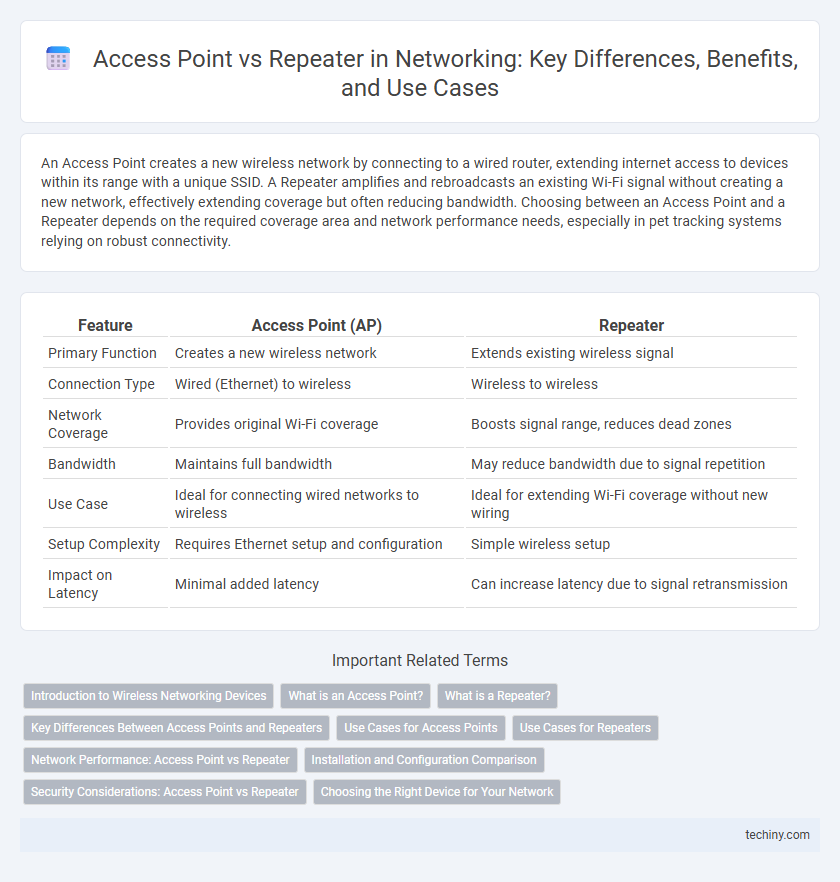An Access Point creates a new wireless network by connecting to a wired router, extending internet access to devices within its range with a unique SSID. A Repeater amplifies and rebroadcasts an existing Wi-Fi signal without creating a new network, effectively extending coverage but often reducing bandwidth. Choosing between an Access Point and a Repeater depends on the required coverage area and network performance needs, especially in pet tracking systems relying on robust connectivity.
Table of Comparison
| Feature | Access Point (AP) | Repeater |
|---|---|---|
| Primary Function | Creates a new wireless network | Extends existing wireless signal |
| Connection Type | Wired (Ethernet) to wireless | Wireless to wireless |
| Network Coverage | Provides original Wi-Fi coverage | Boosts signal range, reduces dead zones |
| Bandwidth | Maintains full bandwidth | May reduce bandwidth due to signal repetition |
| Use Case | Ideal for connecting wired networks to wireless | Ideal for extending Wi-Fi coverage without new wiring |
| Setup Complexity | Requires Ethernet setup and configuration | Simple wireless setup |
| Impact on Latency | Minimal added latency | Can increase latency due to signal retransmission |
Introduction to Wireless Networking Devices
Access Points (APs) create new wireless networks by connecting wired devices to wireless clients, extending network coverage with dedicated hardware and IP address management. Repeaters, also known as range extenders, amplify and retransmit existing wireless signals without creating a separate network, helping to eliminate dead zones but potentially reducing overall throughput. Both devices enhance wireless connectivity, but APs provide more robust network management and scalability compared to repeaters.
What is an Access Point?
An Access Point (AP) is a networking device that creates a wireless local area network (WLAN) by connecting wired devices to Wi-Fi clients, enabling seamless wireless communication. It functions as a central hub for wireless devices, extending the network's range and managing data traffic efficiently between local devices and the main router. Access Points support multiple users simultaneously with secure authentication and can be integrated into enterprise networks for scalable wireless coverage.
What is a Repeater?
A repeater is a network device that receives, amplifies, and retransmits signals to extend the coverage area of a wireless network. It helps eliminate dead zones by boosting the signal strength between the router and devices located far from the primary access point. Unlike access points, repeaters do not create a new network but strengthen the existing wireless connection.
Key Differences Between Access Points and Repeaters
Access Points create new wireless networks by connecting to a wired router, extending network coverage while managing multiple client devices through dedicated IP addresses. Repeaters amplify existing Wi-Fi signals without creating a new network, improving range but often reducing bandwidth due to signal retransmission. Key differences include their function in network expansion, with Access Points providing managed connectivity and Repeaters serving solely as signal boosters.
Use Cases for Access Points
Access Points are ideal for creating extended wireless networks in large buildings or office environments where multiple devices require direct Wi-Fi connections. They provide a centralized wireless signal source with robust security and management features, making them suitable for environments demanding high throughput and stable connectivity. Unlike repeaters, Access Points connect directly to the wired network, avoiding signal degradation and ensuring consistent network performance.
Use Cases for Repeaters
Repeaters are primarily used to extend wireless network coverage in areas where the signal strength is weak or obstructed, such as large homes, offices, or outdoor spaces. They amplify and retransmit existing Wi-Fi signals, effectively eliminating dead zones and improving connectivity in remote corners. Ideal for environments with multiple walls or floors, repeaters enhance network reliability without requiring additional wired infrastructure.
Network Performance: Access Point vs Repeater
Access points create a new wireless network, enhancing network performance by providing dedicated bandwidth and reducing interference, resulting in faster and more stable connections. Repeaters extend existing Wi-Fi signals but often halve bandwidth due to signal retransmission, causing increased latency and weaker performance in high-traffic environments. For optimized network speed and reliability, access points outperform repeaters by maintaining higher data throughput and lower packet loss.
Installation and Configuration Comparison
Access points require direct connection to a wired network and involve configuring SSID, security settings, and IP addresses for optimal performance, typically through a web-based interface or management software. Repeaters extend wireless coverage without wiring but need placement within range of the existing network and basic setup to match the SSID and security protocols of the primary router. Installation of access points is more complex due to physical cabling and detailed configuration, whereas repeaters offer simpler wireless setup but may introduce latency and reduced bandwidth.
Security Considerations: Access Point vs Repeater
Access Points offer enhanced security measures such as WPA3 encryption and enterprise-grade authentication protocols, making them ideal for secure network extensions. Repeaters typically retransmit existing signals without adding additional security layers, which can expose the network to potential vulnerabilities. Enterprises prioritize Access Points to maintain data integrity and prevent unauthorized access compared to the limited security controls available in repeaters.
Choosing the Right Device for Your Network
Selecting between an access point and a repeater depends on network requirements such as coverage area and bandwidth needs. Access points create new wireless networks by connecting to wired routers, ideal for expanding network capacity and reducing congestion. Repeaters amplify existing wireless signals to extend coverage but may reduce overall network speed due to signal rebroadcasting.
Access Point vs Repeater Infographic

 techiny.com
techiny.com